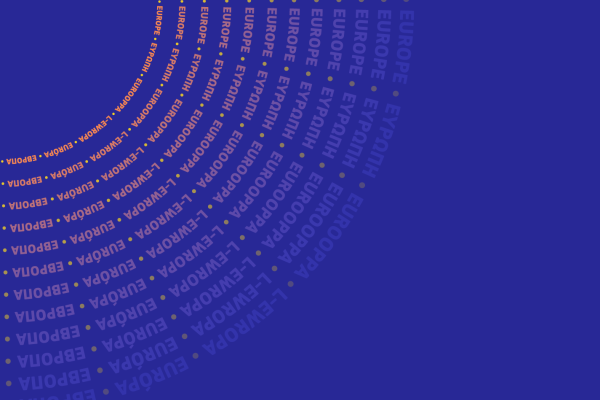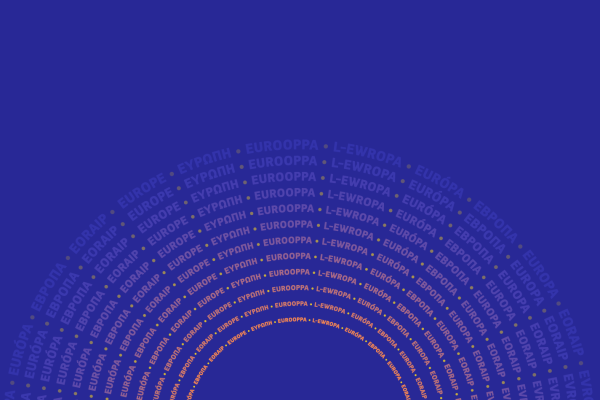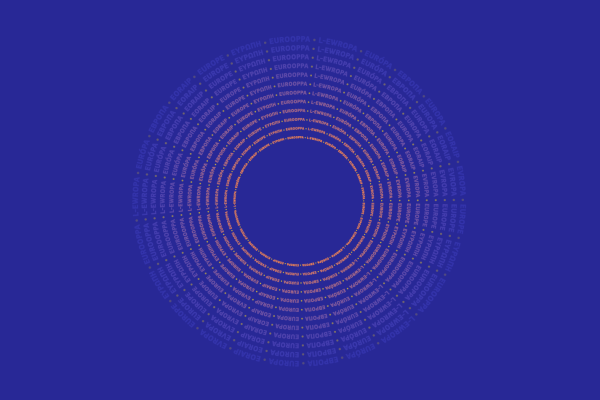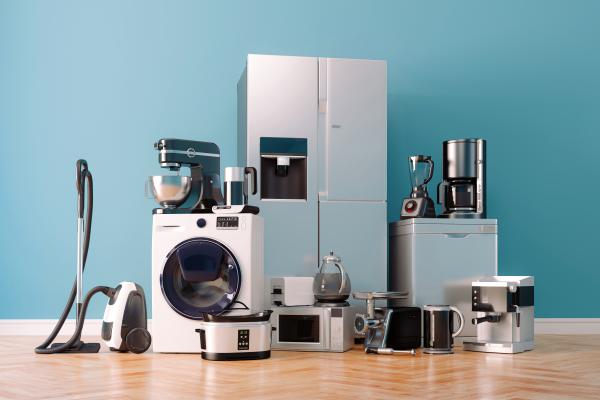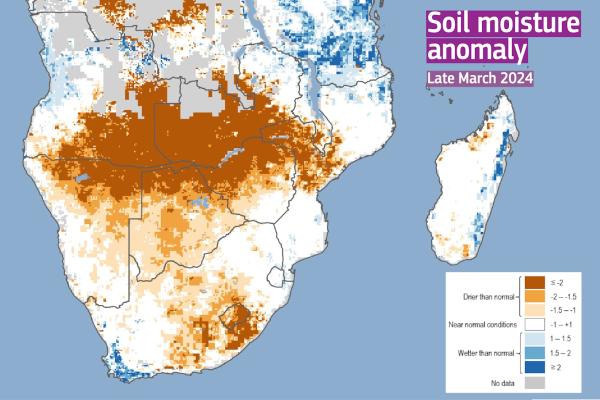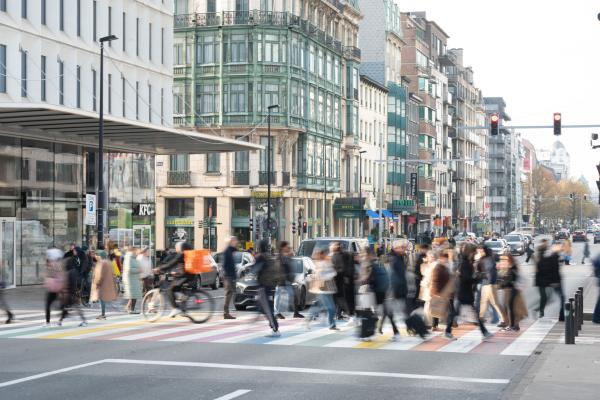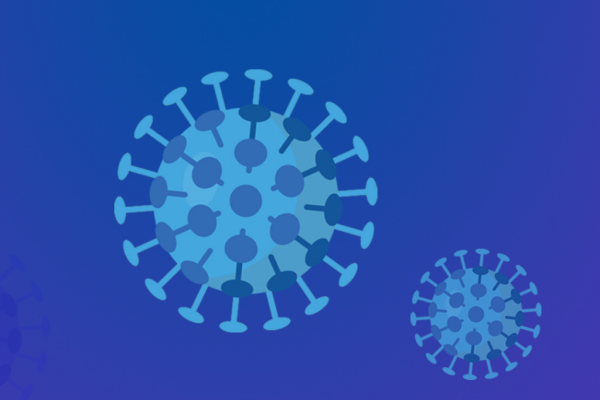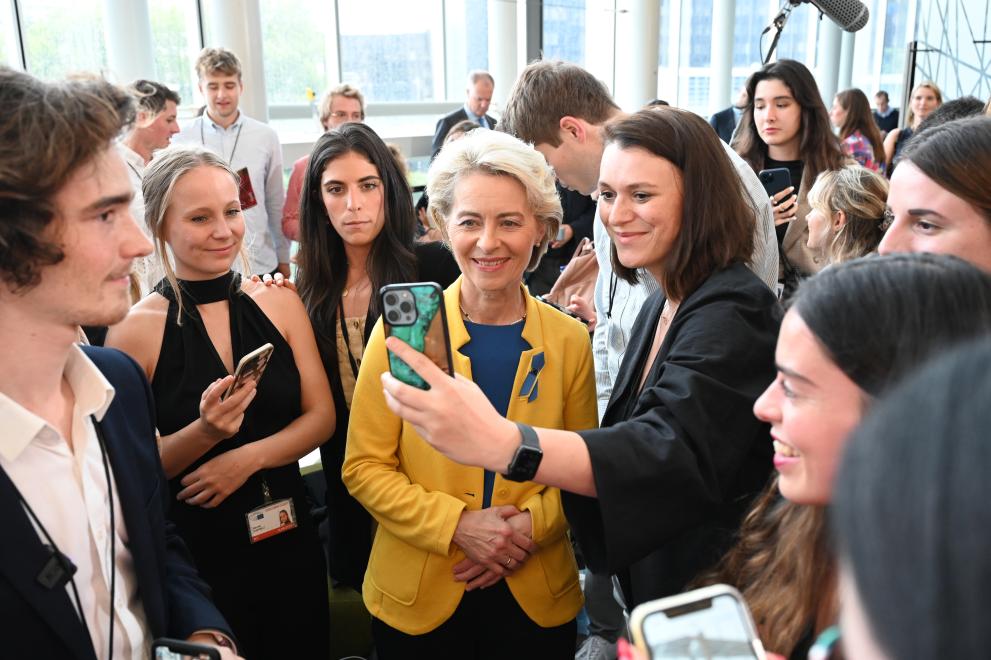
Every year, the President of the European Commission shapes the EU’s political agenda in her State of the Union (SOTEU) speech. While we count down to this year’s address, find out how JRC research contributed to many Commission's headline policies since SOTEU 2022.
Solidarity with Ukraine | Energy security | Hydrogen | Disaster management | Resilient chips ecosystem | Critical raw materials | European centre for Algorithmic Transparency | New European Bauhaus
Solidarity with Ukraine
“Europe’s solidarity with Ukraine will remain unshakeable.”
von der Leyen, SOTEU 2022
JRC has a longstanding record of partnership with Ukraine, addressing key national priorities such as strengthening the Research & Innovation (R&I) ecosystem, fostering approximation with the EU acquis, supporting policy design and technology transfer, as well as promoting the green transition and advancing nuclear safety and security.
After Russia’s unprovoked invasion of Ukraine, JRC put to use its expertise to support the Commission’s response to the emerging context and needs. Having mobilised an internal dedicated task force since the first days of the attack, JRC carried out a number of activities and studies contributing to a range of efforts to assess the damage from forest fires and air pollution, following the energy sector, and many others. JRC supported crisis coordination and covered topics like energy, chemical, biological, radiological and nuclear (CBRN) threats, economic impact, cyber preparedness and hybrid threats. Read a few examples of research and activities below.
JRC analysed and monitored food security in Ukraine, an area raising concern also for the high risks of supply chain disruptions of cereal imports, with:
-
Specific Monitoring Agricultural Resources (MARS) bulletins to monitor the Ukrainian agricultural production as well as for Russia and Northern Africa.
-
A scientific article quantifying war-induced crop losses in Ukraine in near real-time to strengthen local and global food security.
-
Up-to-date knowledge on the impact of Russia’s war against Ukraine on global food and nutrition security via the Knowledge Centre for Global Food and Nutrition Security.
To support Ukrainian scholars, JRC established a joint fellowship initiative with the European University Institute (EUI) in science for policy competences. The 12-month fellowship programme focused on providing support and a safe academic space to Ukrainian scholars affected by the war, with a specific emphasis placed on women researchers.
Energy security
“We have to ensure our security of supply.”
von der Leyen, SOTEU 2022
JRC analysis contributed to the successful filling of gas storage in 2022 and with planning filling trajectories for the next years.
While this helps reduce our dependency on Russian fossil fuels and ensures our demand for gas is met, JRC ongoing task remains focused on safeguarding energy supply security, advancing energy efficiency and conservation, fostering the development of new and renewable energy sources, and promoting the interconnection of energy networks to facilitate the green transition and address its societal and distributional consequences. JRC also actively evaluates clean and innovative technologies to support the transition towards a more secure, sustainable, and affordable energy landscape for all Europeans.
JRC keeps supporting the delivery of the REPowerEU Plan. For example, our scientists analyse solar panels to make sure they are reliable and more sustainable and test their different applications. This work strengthens the EU’s energy autonomy by lowering dependency on imports. JRC also developed an open, online tool that tells citizens how much energy solar panels can produce on their roofs, almost everywhere in the world. More than 4 million people already used the Photovoltaic Geographical Information System (PVGIS) in 2023.
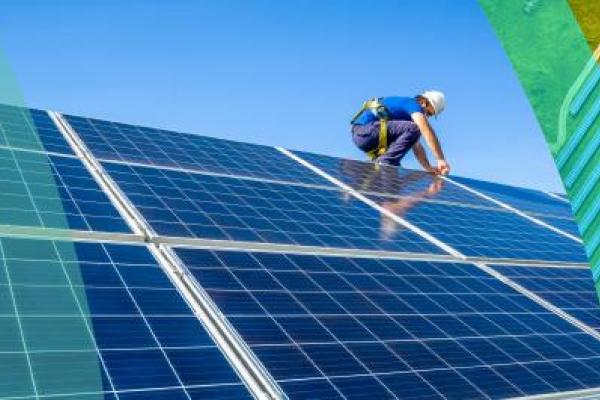
PVGIS is a free web application that allows the user to get data on solar radiation and photovoltaic system energy production, in most parts of the world.
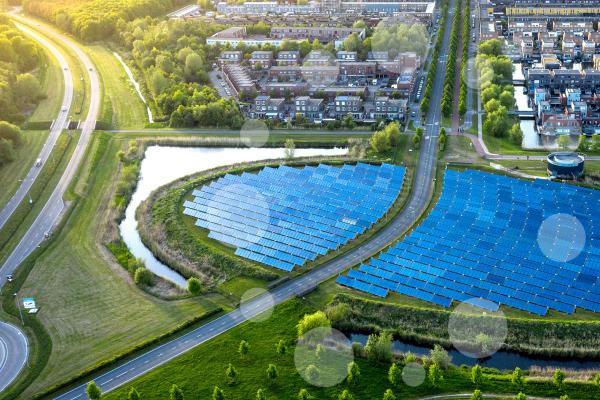
Sustainable, clean, innovative, and competitive energy solutions.
Hydrogen
“Hydrogen can be a game changer for Europe.”
von der Leyen, SOTEU 2022
JRC research on hydrogen fuel cells and production methods is a strong added value to the Commissions’ efforts to scale up a European hydrogen economy.
JRC work focuses on collecting valuable technical expertise on the hydrogen technological applications such as mobility or decarbonised industrial processes. JRC also studies water electrolysis (a critical technology for producing hydrogen from renewable or nuclear electricity) and the feasibility of repurposing gas pipelines to transport hydrogen. Our work also focuses on sustainability and the needs for natural resources, providing a full picture which includes the potential impacts of hydrogen. Such research provides unbiased data, extremely valuable towards the achievement of the REPowerEU’s targets (10 million tonnes of domestic renewable hydrogen production and 10 million tonnes of imports by 2030).
Relevant research: The role of hydrogen in energy decarbonisation scenarios, Assessment of hydrogen delivery options (and Science for Policy brief).
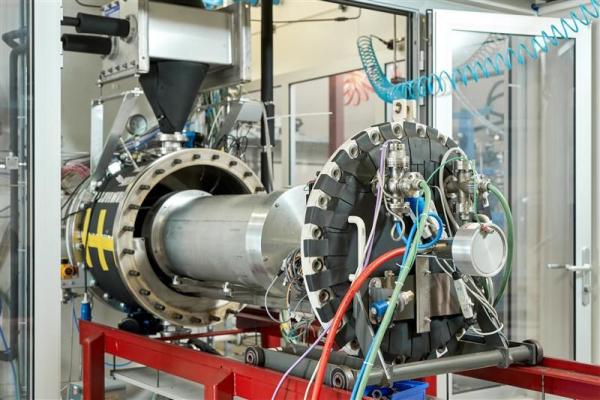
Hydrogen is the lightest gas in the universe. Although it is not a primary energy source, such as coal or gas, is an energy carrier that can store and deliver energy in a widely usable form.
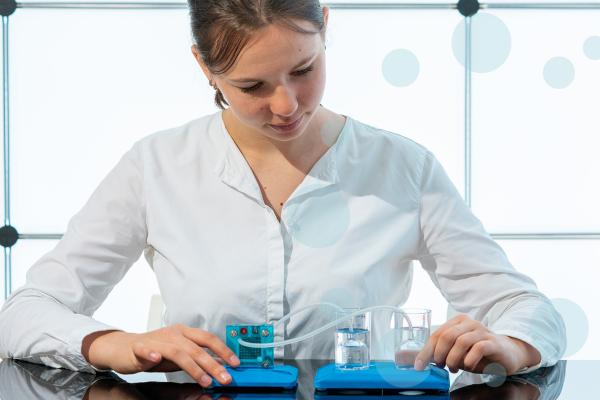
Hydrogen and other decarbonised gases.
Disaster management
“As disasters become more frequent and more intense, Europe will need more capacity.”
von der Leyen, SOTEU 22
JRC’s experts monitor droughts and fires for a fast response on the ground. JRC supports EU Member States with early warning, planning and preparing for disasters.
Effective disaster management depends on reliable data that helps the EU and its partners anticipate and monitor crises and respond to them effectively. JRC is a key contributor to the science behind this: its mapping and satellite imagery and tools strengthen the robustness and evidence-base of the EU’s humanitarian aid and civil protection in the event of disasters. Also, its data strengthen situational awareness and support both reactive and proactive anticipation, as well as mitigation strategies.
Let’s have a look at specific cases. Through early warnings systems, our scientists brought awareness on the drought situation in Europe and in South America. JRC data showed that 2022 was the second-worst wildfire season since records began (2023 is not yet accounted for). Besides pointing out the most cost-efficient river flood adaptation measures, our improvements to our hydrological models and flood hazard maps make flood forecasting increasingly accurate. In addition, JRC (co-)built systems like the Risk Data Hub or INFORM further combine those tools with other data sources. User-friendly dashboards, fed by extensive algorithms, also provide quantitative analysis on humanitarian crises and disasters.
Beyond anticipation data, JRC works with ongoing emergencies. JRC has recently assessed the extent of wildfires in Greece and Portugal, floods in Norway, soil erosion in Slovenia, and a cyclone in Mozambique. The earthquakes in Türkiye are another example where JRC maps, which identify and estimate affected areas and damages to people and infrastructure, helped emergency centres and local with information to act.
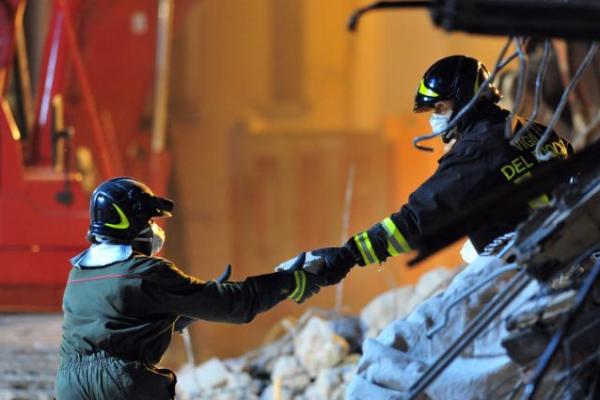
Natural and man-made disasters have significant impacts on society, the environment and economy. We monitor and assesses the risk of disasters such as droughts, floods, forest fires, earthquakes, tsunamis, cyclones and dispersion of radioactive gases
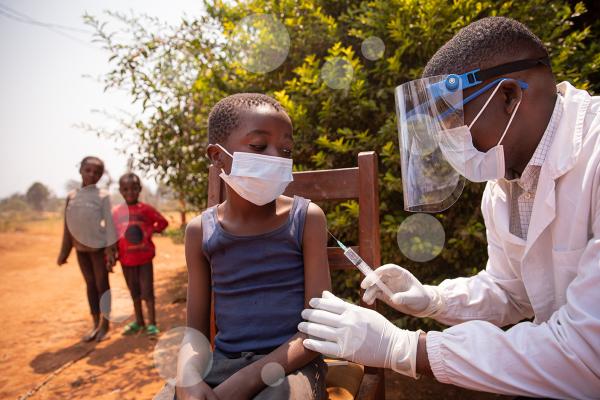
Enhanced situational awareness for crisis management.
Resilient chips ecosystem
“Five years ago, Europe launched the Battery Alliance. And soon, two third of the batteries we need will be produced in Europe. Last year I announced the European Chips Act. And the first chips gigafactory will break ground in the coming months. We now need to replicate this success.”
von der Leyen, SOTEU 2022
With the purpose of increasing our capacity to design, manufacture and package chips, JRC and DG CNECT mapped EU companies involved in the chips value chain. JRC is also assisting DG CNECT in the creation of a monitoring system to detect potential vulnerabilities in the chip supply chain and act rapidly in case of crisis.
Chips production capacity plays a strong role in digital and ecological transitions. JRC data will inform the Commission towards the achievement of the digital decade target of doubling the EU’s global market share in chips production to 20% by 2030.
Critical raw materials
“We need access to raw materials our industry needs. (…) This is why I am announcing a European Critical Raw Materials Act.”
von der Leyen, SOTEU 2022
JRC helps assess ways to reduce dependencies on third countries and better manage strategic supply chains through: foresight analyses; detailed modelling of the strategic supply chains; mapping and monitoring tools; promotion of a more sustainable and circular critical raw materials economy, support to stress-tests; intelligence for the development of international partnerships; and development of early-warning systems.
The EU is strongly dependent on third countries along the complete value chain of the strategic technologies for the energy and digital transitions, and the space and defence agenda. JRC research (such as the foresight study published alongside the Critical Raw Materials Act) arms the EU with information to help it overcome these dependencies, which pose a threat to the EU’s green transition, strategic autonomy, and the competitiveness of our clean energy industry.
Good news time! JRC’s report predicts that 350 tonnes of rare earth metals will in principle be produced from recycling of electric vehicle motors in 2035 and 1400 tonnes by 2040 – representing about 12% of the expected demand for rare earth metals needed for electric cars motors. This will be facilitated by better design of vehicles, improved collection and technological development of recycling. Moreover, the Raw Materials Information System (RMIS) estimates that policies, governance and innovation could ensure as much as 10% of lithium and 51% of cobalt could come from recycled batteries by 2040 (source, figure 4).
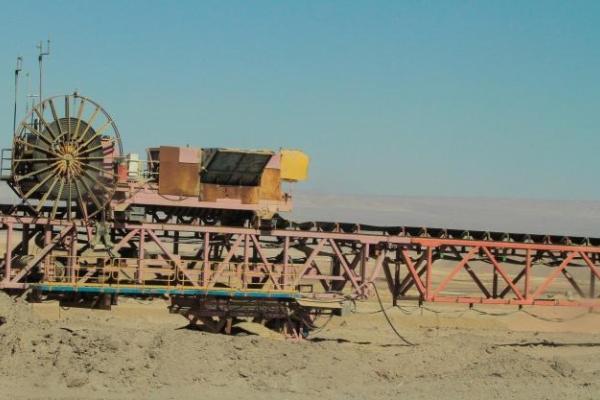
The JRC Raw Materials Information System provides a structured repository of information on raw materials.
European Centre for Algorithmic Transparency
“We have made ambitious proposals (…) to contain the gatekeeper power of major platforms, to underpin the democratic responsibility of those platforms, to foster innovation, to channel the power of artificial intelligence.”
von der Leyen, SOTEU 2021
The European Centre for Algorithmic Transparency (ECAT) will contribute to a safer online environment. By giving transparency to the functioning of algorithms, ECAT will help citizens better understand the reasons behind what they see online and the products they are offered.
As established by the Digital Services Act (DSA), specific platforms will have to identify, analyse and mitigate systemic risks, including how illegal content and disinformation can be amplified through their services. In this context, ECAT, launched by JRC and DG CNECT on 18 April 2023 (press release), will provide the Commission with in-house technical and scientific expertise to ensure that algorithmic systems comply with the risk management, mitigation and transparency requirements in the DSA. This includes the performance of technical analyses and evaluations of algorithms. JRC was chosen to lead ECAT because of its extensive background in AI, data science, algorithmic systems, and an understanding of the impact of digital transformation on European society and the economy.
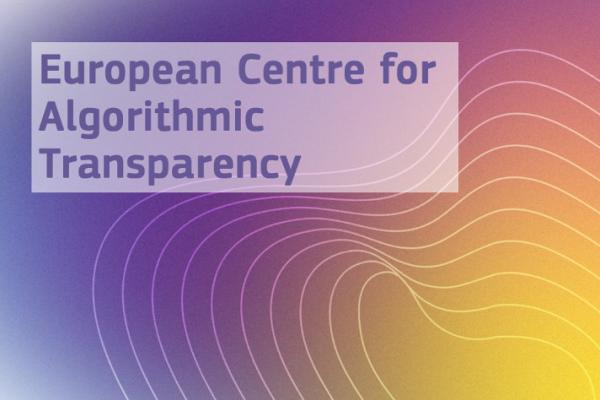
This Centre, hosted by the JRC, will contribute to a safer, more predictable and trusted online environment for people and business.

Trustworthy AI for a fair and democratic Europe.
New European Bauhaus
“We need to give our systemic change its own distinct aesthetic – to match style with sustainability. This is why we will set up a New European Bauhaus – a co-creation space where architects, artists, students, engineers, designers work together to make that happen.”
von der Leyen, SOTEU 2020
The New European Bauhaus (NEB) – led and coordinated by JRC – has made significant progress: it has its own Community of over 1.000 members active across Europe and beyond, and it is inspiring a number of bottom-up projects and initiatives that test and demonstrate NEB ideas and actions.
Several NEB lighthouse demonstrators came into being with the initiative’s bottom-up co-creation process. Spread across Europe, the projects will provide a diversity of results that can be adapted and replicated in similar activities and demonstrators in Europe and beyond, helping to inspire future projects. The transnational project EHHUR, for example, supports cities and vulnerable residents in transforming their built environment by tackling socio-economic and cultural challenges.
Talking about achievements, the annual New European Bauhaus Prizes are a special way of supporting initiatives on the ground. They give visibility to examples and concepts illustrating that beautiful, sustainable, inclusive places exist, paving the way to the future. The 2023 edition received more than 1.400 applications, out of which 15 projects were awarded.
Moreover, in 2022, the NEB Festival brought together people from all walks of life to debate and shape our future and highlight projects and grassroots initiatives that encompass the NEB values. The next edition will take place on 18-20 April 2024.
NEB has also launched a number of initiatives to help rebuilding Ukraine in a sustainable and inclusive way, e.g. through a series of capacity-building webinars that provided inspiration and practical help for teams from Ukrainian municipalities involved in rebuilding efforts.
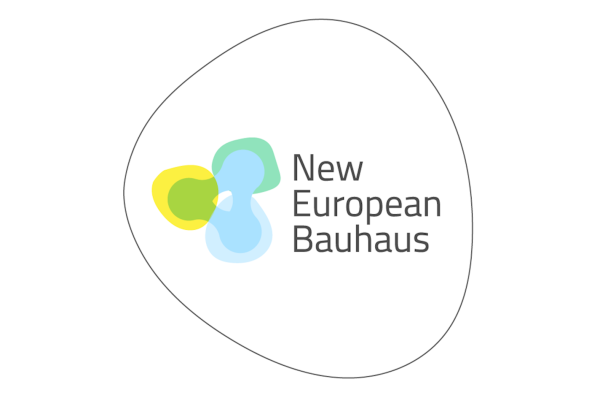
A creative and interdisciplinary initiative that connects the European Green Deal to our living spaces and experiences.
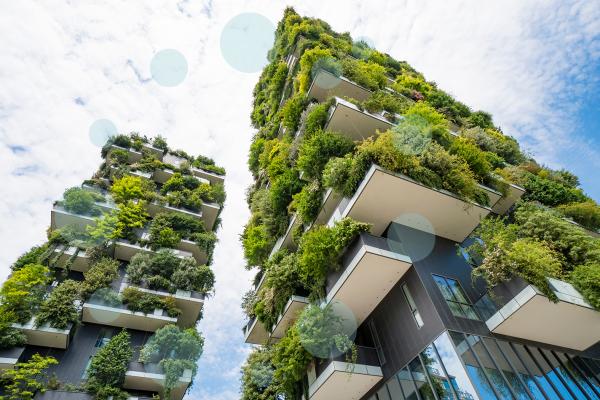
Cities and buildings for better lives.
Don’t miss SOTEU 2023, follow it live on 13 September.
Details
- Publication date
- 11 September 2023
- Author
- Joint Research Centre

